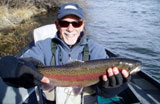Description
Mike Susslin
will be leading the Lower American River
steelhead outing this month. Egg patterns,
along with alevin (baby salmon) patterns,
are indispensable for success on the river
at this time of year. But, rather than
featuring egg patterns here, I highly
recommend reading Scott Sanchez’s article in
the Winter 2007 issue of Fly Tyer
magazine, on page 40. The article is titled
“Three Minute Eggs;’ it features many
different egg styles, and discusses hooks,
materials, and tying techniques in depth.
So, instead of
featuring an egg pattern here, let’s do a
leech pattern that you can swing on a
floating or sink tip line. Lower American
steelhead attack properly presented leeches,
so it pays to have a few of these flies in
your fly box. The pattern I have selected is
one of Andy Burk’s many creations; he calls
it the Tiger Leech. It’s simple to tie and
uses common materials. See his article in
the Nov/Dec 2007 issue of California Fly
Fisher. So, let’s get busy.
Tying Instructions
|
|
1. Smash the hook barb unless you are using
a barbless hook. Wind 6-8 turns of .025”
lead on the hook, but leave about ¼” of room
behind the eye. Use Flexament on the lead
winds and hook shank. Cover the hook shank
and lead with thread. |
|
|
|
|
|
2. Just above the back of the barb tie on a clump of orange marabou, and then a
slightly smaller clump of black marabou. The tail should be relatively long. |
|
|
|
|
|
3. At the same point, tie in three
strands of black crystal flash on
each side of the hook; trim it to
the length of the tail. |
|
|
|
|
|
4. At the same point, tie in a piece of
black and a piece of orange Estaz or Jay
Fair Short Shuck and advance the thread to
the front of the hook. |
|
|
|
|
|
5. Wrap these forward together (don’t twist
them into a single strand) and tie them off
behind the hook eye. |
|
|
|
|
|
6. Form a small thread head and whip
finish. |
|
|
|
|
|
Tying
Tips
1. Vary the colors to suit your needs. Try
Jay Fair’s burnt orange color, which is a
very fishy material. Olive works well too.
2. For the tail flash, try
wrapping three strands around the tying thread; then bind the thread to the hook
and hold the two halves of the flash apart so that they naturally go down both
sides of the hook.
Swing this dude on a floating line with a long leader (12’) or on a sink tip
with a shorter leader. Keep a firm grip on your rod because the steelies hit
hard. |
|
|
|
|
 |
|

